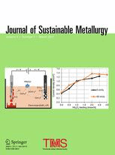
Journal of Sustainable Metallurgy
Scope & Guideline
Pioneering research for a greener materials industry.
Introduction
Aims and Scopes
- Sustainable Resource Recovery:
The journal emphasizes methods for recovering valuable metals and materials from waste products, including electronic waste, industrial by-products, and mining residues. This includes hydrometallurgical, pyrometallurgical, and biotechnological approaches. - Decarbonization of Metallurgical Processes:
Research on reducing carbon emissions associated with metallurgical processes, focusing on alternative reducing agents, hydrogen-based technologies, and carbon capture methods. - Innovative Recycling Methods:
Exploration of novel recycling techniques, including solvent extraction, bioleaching, and mechanochemical processes, to improve the efficiency and sustainability of metal recovery. - Lifecycle Assessment and Environmental Impact Studies:
Studies focusing on the environmental impact of metallurgical processes, including life cycle assessments (LCA) to evaluate the sustainability of various methodologies. - Integration of Circular Economy Principles:
Promoting the circular economy in metallurgy by investigating the reuse of waste materials in metallurgical processes and the development of eco-friendly materials. - Materials Characterization and Process Optimization:
Research on the characterization of metallurgical materials and optimization of processes to enhance performance, reduce waste, and improve recyclability.
Trending and Emerging
- Hydrogen-Based Reduction Technologies:
An increasing number of studies focus on hydrogen as a reducing agent in metallurgical processes, promoting low-carbon alternatives and aligning with global decarbonization goals. - Biotechnological Approaches in Metallurgy:
Research on the application of biotechnological methods, including bioleaching and bioremediation, is gaining traction as a sustainable alternative for metal recovery. - Circular Economy Practices:
There is a growing interest in circular economy principles, with research focusing on the sustainable utilization of waste materials and resource recovery in metallurgical processes. - Advanced Characterization Techniques:
Emerging studies utilize advanced characterization techniques to better understand materials and processes, leading to improved recycling methods and process optimizations. - Life Cycle Assessment Methodologies:
The application of life cycle assessment (LCA) methodologies is trending, as researchers aim to comprehensively evaluate the environmental impacts of metallurgical processes.
Declining or Waning
- Traditional Pyrometallurgical Processes:
Research on conventional pyrometallurgical methods has decreased as the field shifts towards more sustainable and innovative technologies that minimize environmental impact. - Use of Fossil Fuels in Metallurgy:
There is a declining focus on processes that rely heavily on fossil fuels, as the industry moves towards utilizing renewable energy sources and alternative reducing agents. - Single-Metal Recovery Techniques:
The emphasis on single-metal recovery processes is waning, with a shift towards integrated approaches that recover multiple metals simultaneously from complex waste streams. - Non-Eco-Friendly Chemical Processes:
Research on chemical processes that are not environmentally friendly has diminished, as the journal prioritizes sustainable and green chemistry methodologies.
Similar Journals
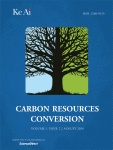
Carbon Resources Conversion
Unlocking the Potential of Carbon Resources for a Sustainable WorldCarbon Resources Conversion is a prominent interdisciplinary journal that focuses on the innovative aspects of carbon resource utilization, aiming to advance research and applications in catalysis, fuel technology, and materials science. Published by KEAI PUBLISHING LTD, this Open Access journal, established in 2018, has rapidly developed a reputation for its high-quality research, evident from its impressive quartile rankings in 2023, including Q2 in Catalysis and Q1 in both Fuel Technology and Materials Science (miscellaneous). With its dedicated editorial board and rigorous peer-review process, Carbon Resources Conversion serves as an essential platform for researchers, professionals, and students striving to address contemporary challenges in energy and materials sustainability. The journal's strong Scopus rankings reaffirm its influence and accessibility within the scientific community, making it a vital resource for advancing the knowledge and application of carbon resource conversion processes.
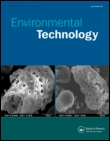
ENVIRONMENTAL TECHNOLOGY
Driving Progress in Water Science and Waste ManagementENVIRONMENTAL TECHNOLOGY, published by Taylor & Francis Ltd, is a prominent journal that serves as a crucial platform for disseminating pioneering research in the multifaceted fields of Environmental Science, Water Science and Technology, and Waste Management. With an impressive record spanning over three decades from 1990 to 2024, the journal holds significant rankings in various categories, including Q3 in Environmental Chemistry and Q2 in both Medicine (miscellaneous) and Water Science and Technology for 2023. Its Scopus rankings further position it within the top tiers of Environmental Science disciplines, reflecting its influence and relevance, particularly as it pertains to pressing global environmental challenges. While the journal does not offer an open access option, it remains dedicated to advancing knowledge and promoting innovative solutions among researchers, professionals, and students engaged in environmental studies. As it continues to attract high-quality submissions, ENVIRONMENTAL TECHNOLOGY plays a vital role in shaping future research and practices aimed at sustainable environmental management.

ENVIRONMENT DEVELOPMENT AND SUSTAINABILITY
Advancing Sustainable Solutions for a Changing WorldEnvironment, Development and Sustainability is a leading academic journal published by Springer, dedicated to advancing the understanding of the intricate relationships between environmental processes, human development, and sustainable practices. With an ISSN of 1387-585X and an E-ISSN of 1573-2975, this journal provides a platform for high-quality interdisciplinary research that integrates insights from economics, geography, and environmental policy. As of 2023, the journal boasts an impressive impact factor ranking, positioned in the Q2 category for Economics and Econometrics, Q1 for Geography, Planning and Development, and Q2 for Management, Monitoring, Policy and Law. This impressive stature has earned it a significant Scopus ranking, placing it within the top tiers of its field, particularly in Social Sciences and Environmental Science. With a publication timeline extending from 1999 to 2024, the journal serves as a valuable resource for researchers, professionals, and students alike, promoting knowledge exchange and fostering groundbreaking ideas essential for sustainable development. Although it operates under a subscription model, the impact of its articles is profound, making it a pivotal outlet for researchers striving towards sustainability in a rapidly changing world.
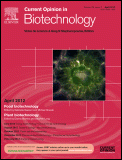
CURRENT OPINION IN BIOTECHNOLOGY
Navigating the Future of BioengineeringCurrent Opinion in Biotechnology, published by Elsevier Science Ltd, is a premier academic journal dedicated to providing critical insights and evaluations on emerging trends and developments in the ever-evolving fields of biotechnology and bioengineering. With an impressive impact factor and ranking in the Q1 quartile across bioengineering, biomedical engineering, and biotechnology, this journal serves as an indispensable resource for researchers, professionals, and students alike. Spanning from 1990 to 2024, the journal facilitates scholarly discourse by featuring concise reviews authored by leading experts, covering cutting-edge topics and innovative technologies. With a strong presence in renowned databases such as Scopus, where it ranks within the top percentiles in multiple categories, Current Opinion in Biotechnology not only contributes to the academic community but also impacts industry practices, making it a highly relevant platform for those looking to stay at the forefront of biotechnology innovation.
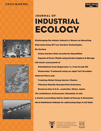
JOURNAL OF INDUSTRIAL ECOLOGY
Advancing Sustainable Solutions for Industrial PracticesJOURNAL OF INDUSTRIAL ECOLOGY, published by Wiley, is a leading academic journal that focuses on the intersection of industrial practices and ecological sustainability. With an ISSN of 1088-1980 and an E-ISSN of 1530-9290, this journal has established itself as a premier outlet for research in economic, environmental, and social sciences, evidenced by its Q1 rankings in key categories such as Economics and Econometrics, Environmental Science, and General Social Sciences as of 2023. Spanning over two decades from 1997 to 2024, it offers invaluable insights into innovative approaches for designing sustainable industrial systems, informing policy decisions, and advancing interdisciplinary collaborations. While the journal does not currently offer open access options, its high impact in the field—illustrated by its impressive Scopus rankings, where it ranks 5th among 275 in General Social Sciences and 23rd among 233 in General Environmental Science—reinforces its importance to researchers, professionals, and students dedicated to the principles of sustainable development and industrial ecology.
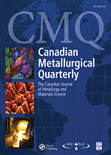
CANADIAN METALLURGICAL QUARTERLY
Unveiling Breakthroughs in Metals and Alloys.Canadian Metallurgical Quarterly is a prestigious scholarly journal published by Taylor & Francis Ltd, dedicated to the field of metallurgical engineering and materials science. With a rich history dating back to its inception in 1962 and continuing through its most recent publications, this journal serves as a vital platform for the dissemination of innovative research, advancements, and critical reviews in metallurgy, metals, and alloys. Positioned strategically within the academic community, it holds a significant impact factor and is currently rated in the Q2 category for Metals and Alloys, and Q3 in Industrial and Manufacturing Engineering as of 2023, showcasing its authoritative role in these disciplines. Although it does not offer open access, the journal remains widely recognized for its rigorous peer-review process, ensuring that published work adheres to the highest standards of scientific quality. Researchers, professionals, and students alike will find invaluable insights and contributions that drive the field forward.
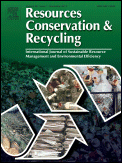
RESOURCES CONSERVATION AND RECYCLING
Innovating resource management for a sustainable world.RESOURCES CONSERVATION AND RECYCLING, published by Elsevier, is an esteemed journal that has been at the forefront of academic discourse since its inception in 1988. Focusing on the critical fields of resource management, recycling, and sustainability, this journal has established itself as a leading platform for innovative research, holding a prestigious position in the Q1 quartile for both Economics and Econometrics, and Waste Management and Disposal. With a remarkable Scopus ranking of #4 in its respective categories, it represents the pinnacle of scholarly contributions, aimed at fostering knowledge that drives efficient resource utilization and effective waste management practices. The journal's commitment to advancing the understanding of economic implications and environmental impacts of resource conservation is reflected in its diverse array of articles, case studies, and reviews. Although it is not an open-access journal, the valuable insights it offers are essential for researchers, professionals, and students who are dedicated to addressing pressing environmental challenges and enhancing sustainable practices on a global scale.

Green Energy & Environment
Driving Change Through Cutting-edge Environmental Research.Green Energy & Environment, published by KEAI PUBLISHING LTD, stands as a pioneering journal dedicated to the dynamic fields of renewable energy, sustainability, and environmental science. With its ISSN 2096-2797 and E-ISSN 2468-0257, this Q1 journal holds a noteworthy presence in academic discourse, reflecting its high-quality contributions within these critical areas of research. Launched in 2016, it has consistently embraced an Open Access model, facilitating unhindered access to research findings and fostering collaboration across global communities. Based in Beijing, China, this journal is dedicated to disseminating innovative insights that are essential for addressing urgent global challenges related to energy and environmental sustainability. Researchers, professionals, and students alike benefit from a platform that not only showcases pioneering research but also encourages interdisciplinary dialogue and knowledge exchange in the pursuit of a sustainable future.
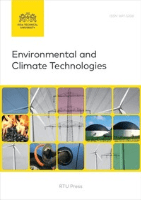
Environmental and Climate Technologies
Exploring Frontiers in Environmental Science and Renewable Energy.Environmental and Climate Technologies is a premier open-access journal dedicated to advancing knowledge in the fields of environmental science and renewable energy. Published by SCIENDO since 2009, this journal plays a crucial role in disseminating innovative research and interdisciplinary studies that address the pressing challenges posed by climate change and sustainable development. With its current positioning in the Q2 quartile for Environmental Science (miscellaneous) and Q3 for Renewable Energy, Sustainability and the Environment, it is recognized for its significant contributions to the academic community, ranking #107 out of 233 in General Environmental Science and #161 out of 270 in Renewable Energy. Hailing from Germany and operating under an open-access policy, Environmental and Climate Technologies ensures that research remains accessible to a global audience, fostering collaboration and discussion among researchers, professionals, and students alike. The journal invites rigorous scientific inquiries and practical solutions that can mitigate the impact of climate-related issues, making it a vital resource for those committed to environmental stewardship and sustainability.

International Journal of Minerals Metallurgy and Materials
Advancing Knowledge in Minerals and Materials ScienceThe International Journal of Minerals Metallurgy and Materials, published by SPRINGER, stands as a prominent forum in the fields of minerals, metallurgy, and materials science. With an ISSN of 1674-4799 and an E-ISSN of 1869-103X, this journal has been disseminating high-quality research since its inception in 2009 and will continue to publish until 2024. Based in China, this journal supports Open Access options, maximizing the reach and impact of scholarly work. Enhanced by its impressive Scopus rankings, it holds a Q2 position in Geochemistry and Petrology and a Q1 ranking in Materials Chemistry, Mechanical Engineering, Mechanics of Materials, and Metals and Alloys for 2023. Such accolades reflect its continual commitment to advancing knowledge in these disciplines, making it essential reading for researchers, professionals, and students aiming to stay abreast of contemporary developments and innovative solutions in materials science.